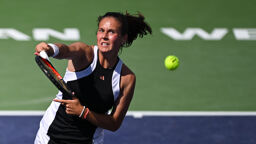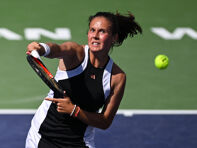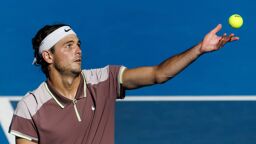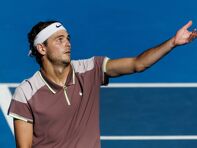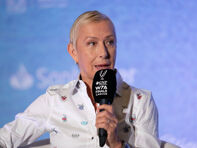There are 17 players in the main draw for the women’s singles at the U.S. Open who are competing as neutral athletes.
Daria Kasatkina is one of them. The 13th seed is one of only two out gay players in singles action at the grand slam this year.
As was the case in the 2022 tournament at Flushing Meadows, Russian athletes like Kasatkina as well as those from Belarus are allowed to compete but can only do so under a neutral flag.
In a New York Times feature, the 26-year-old discusses her strident opposition to Russia’s assault on Ukraine and her decision to come out publicly last summer.
Get off the sidelines and into the game
Our weekly newsletter is packed with everything from locker room chatter to pressing LGBTQ sports issues.
Talking to journalist Michael Steinberger, Kasatkina mentioned “with a laugh” that she had been considering an unusual request to the governing body of women’s tennis.
“I want to ask the W.T.A. if I can play under the rainbow flag,” she said.
It was back in April 2021 that Kasatkina voiced her support for LGBTQ athletes in an interview with a Russian TV personality. She responded to a question about sexuality in a way that suggested she might be bisexual herself.
That took great courage, because the effect of the so-called ‘gay propaganda law’ enacted by the Russian President was already driving anti-LGBTQ hate across the country.
Then in July 2022 the Barcelona-based player talked for the first time about her relationship with Olympic figure skater Natalia Zabiiako, who won a silver medal in the team event at Pyeongchang 2018.
In that interview, Kasatkina described the conflict with Ukraine as a “complete nightmare” and cried at the prospect of never being able to return to her homeland, let alone hold her girlfriend’s hand in public there.
In December 2022, the anti-gay law was expanded in Russia, so that any information related to being LGBTQ can no longer be disseminated or promoted to adults as well as minors.
Kasatkina addressed these developments with seriousness and candor when she spoke to the Times at Wimbledon last month.
“The laws in our country are getting worse and worse,” she explained.
“I realize to be a gay person in Russia, it’s becoming impossible. And all this together makes me say what I feel and what I want to say.”

It was reported that Kasatkina’s mother had visited her in Barcelona recently but there was no realistic prospect of the player being able to go back and see her parents together in Russia any time soon.
She emphasized her compassion for her fellow everyday citizens. “I really love my country. I love the people,” she added.
On the court, Kasatkina has never been further than the fourth round at the U.S. Open. She got her 2023 challenge underway on Tuesday by coming from a set down to beat Alycia Parks. Next up is another American, Sofia Kenin.
Belgium’s Greet Minnen is the other out gay player in the women’s singles main draw, having come through qualifying. She knocked out two-time champion Venus Williams 6-1 6-1 and will meet Sachia Vickery in round two.
Thursday, Aug. 31, is Pride Day at this year’s US Open.
Titled “Open Pride,” it will be the third year in succession that Flushing Meadows has celebrated LGBTQ inclusion.
Among the activations will be the lighting-up of Arthur Ashe Stadium in rainbow colors, similar to the recent illumination during Pride Month.
Happy #Pride weekend in NYC!
— US Open Tennis (@usopen) June 25, 2023
In honor of New York Pride, Arthur Ashe Stadium is illuminated in rainbow-colored lights all weekend. pic.twitter.com/gOLCYAuA4p
Last week, the tournament was designated a “safe space” by the Stonewall Inn Gives Back Initiative.
A certificate to mark the completion of the 10-step accreditation process was presented at the historic Stonewall Inn itself, in the presence of former player Rennae Stubbs and US Tennis Association chief of diversity, inclusion and equity, Marisa Grimes.
The bar’s co-owner Stacy Lentz, who also serves as the CEO of the Gives Back Initiative, said: “The Stonewall Inn is the original Safe Space, and we are thrilled to expand our reach by certifying the U.S. Open.
“We believe this certification sets an example for sporting events across the globe and ensures that all LGBTQ+ athletes and fans feel welcome and safe.”








